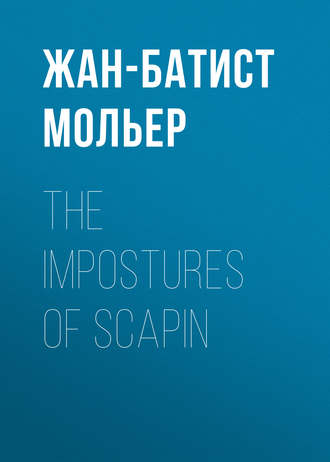
Мольер (Жан-Батист Поклен)
The Impostures of Scapin
SCENE X. – ARGANTE, SCAPIN
SCA. Well, Sir, you see how many people are killed for two hundred pistoles. Now I wish you a good morning.
ARG. (all trembling). Scapin.
SCA. What do you say?
ARG. I will give the two hundred pistoles.
SCA. I am very glad of it, for your sake.
ARG. Let us go to him; I have them with me.
SCA. Better give them to me. You must not, for your honour, appear in this business, now that you have passed for another; and, besides, I should be afraid that he would ask you for more, if he knew who you are.
ARG. True; still I should be glad to see to whom I give my money.
SCA. Do you mistrust me then?
ARG. Oh no; but…
SCA. Zounds! Sir; either I am a thief or an honest man; one or the other. Do you think I would deceive you, and that in all this I have any other interest at heart than yours and that of my master, whom you want to take into your family? If I have not all your confidence, I will have no more to do with all this, and you can look out for somebody else to get you out of the mess.
ARG. Here then.
SCA. No, Sir; do not trust your money to me. I would rather you trusted another with your message.
ARG. Ah me! here, take it.
SCA. No, no, I tell you; do not trust me. Who knows if I do not want to steal your money from you?
ARG. Take it, I tell you, and don't force me to ask you again. However, mind you have an acknowledgment from him.
SCA. Trust me; he hasn't to do with an idiot.
ARG. I will go home and wait for you.
SCA. I shall be sure to go. (Alone.) That one's all right; now for the other. Ah! here he is. They are sent one after the other to fall into my net.
SCENE XI. – GÉRONTE, SCAPIN
SCA. (affecting not to see GÉRONTE). O Heaven! O unforeseen misfortune! O unfortunate father! Poor Géronte, what will you do?
GER. (aside). What is he saying there with that doleful face?
SCA. Can no one tell me whereto find Mr. Géronte?
GER. What is the matter, Scapin?
SCA. (running about on the stage, and still affecting not to see or hear GÉRONTE). Where could I meet him, to tell him of this misfortune?
GER. (stopping SCAPIN). What is the matter?
SCA. (as before). In vain I run everywhere to meet him. I cannot find him.
GER. Here I am.
SCA. (as before). He must have hidden himself in some place which nobody can guess.
GER. (stopping SCAPIN again). Ho! I say, are you blind? Can't you see me?
SCA. Ah! Sir, it is impossible to find you.
GER. I have been near you for the last half-hour. What is it all about?
SCA. Sir…
GER. Well!
SCA. Your son, Sir…
GER. Well! My son…
SCA. Has met with the strangest misfortune you ever heard of.
GER. What is it?
SCA. This afternoon I found him looking very sad about something which you had said to him, and in which you had very improperly mixed my name. While trying: to dissipate his sorrow, we went and walked about in the harbour. There, among other things, was to be seen a Turkish galley. A young Turk, with a gentlemanly look about him, invited us to go in, and held out his hand to us. We went in. He was most civil to us; gave us some lunch, with the most excellent fruit and the best wine you have ever seen.
GER. What is there so sad about all this?
SCA. Wait a little; it is coming. Whilst we were eating, the galley left the harbour, and when in the open sea, the Turk made me go down into a boat, and sent me to tell you that unless you sent by me five hundred crowns, he would take your son prisoner to Algiers.
GER. What! five hundred crowns!
SCA. Yes, Sir; and, moreover, he only gave me two hours to find them in.
GER. Ah! the scoundrel of a Turk to murder me in that fashion!
SCA. It is for you, Sir, to see quickly about the means of saving from slavery a son whom you love so tenderly.
GER. What the deuce did he want to go in that galley for? {Footnote: Que diable allait-il faire dans cette galère? This sentence has become established in the language with the meaning, "Whatever business had he there?"}
SCA. He had no idea of what would happen.
GER. Go, Scapin, go quickly, and tell that Turk that I shall send the police after him.
SCA. The police in the open sea! Are you joking?
GER. What the deuce did he want to go in that galley for?
SCA. A cruel destiny will sometimes lead people.
GER. Listen, Scapin; you must act in this the part of a faithful servant.
SCA. How, Sir?
GER. You must go and tell that Turk that he must send me back my son, and that you will take his place until I have found the sum he asks.
SCA. Ah! Sir; do you know what you are saying? and do you fancy that that Turk will be foolish enough to receive a poor wretch like me in your son's stead?
GER. What the deuce did he want to go in that galley for?
SCA. He could not foresee his misfortune. However, Sir, remember that he has given me only two hours.
GER. You say that he asks…
SCA. Five hundred crowns.
GER. Five hundred crowns! Has he no conscience?
SCA. Ah! ah! Conscience in a Turk!
GER. Does he understand what five hundred crowns are?
SCA. Yes, Sir, he knows that five hundred crowns are one thousand five hundred francs. {Footnote: The écu stands usually for petit écu, which equalled three franks. "Crown," employed in a general sense, seems the only translation possible.}
GER. Does the scoundrel think that one thousand five hundred francs are to be found in the gutter?
SCA. Such people will never listen to reason.
GER. But what the deuce did he want to go in that galley for?
SCA. Ah! what a waste of words! Leave the galley alone; remember that time presses, and that you are running the risk of losing your son for ever. Alas! my poor master, perhaps I shall never see you again, and that at this very moment, whilst I am speaking to you, they are taking you away to make a slave of you in Algiers! But Heaven is my witness that I did all I could, and that, if you are not brought back, it is all owing to the want of love of your father.
GER. Wait a minute, Scapin; I will go and fetch that sum of money.
SCA. Be quick, then, for I am afraid of not being in time.
GER. You said four hundred crowns; did you not?
SCA. No, five hundred crowns.
GER. Five hundred crowns!
SCA. Yes.
GER. What the deuce did he want to go in that galley for?
SCA. Quite right, but be quick.
GER. Could he not have chosen another walk?
SCA. It is true; but act promptly.
GER. Cursed galley!
SCA. (aside) That galley sticks in his throat.
GER. Here, Scapin; I had forgotten that I have just received this sum in gold, and I had no idea it would so soon be wrenched from me. (Taking his purse out of his pocket, and making as if he were giving it to SCAPIN.) But mind you tell that Turk that he is a scoundrel.
SCA. (holding out his hand). Yes.
GER. (as above). An infamous wretch.
SCA. (still holding out his hand). Yes.
GER. (as above). A man without conscience, a thief.
SCA. Leave that to me.
GER. (as above). That…
SCA. All right.
GER. (as above). And that, if ever I catch him, he will pay for it.
SCA. Yes.
GER. (putting back the purse in his pocket). Go, go quickly, and fetch my son.
SCA. (running after him). Hallo! Sir.
GER. Well?
SCA. And the money?
GER. Did I not give it to you?
SCA. No, indeed, you put it back in pour pocket.
GER. Ah! it is grief which troubles my mind.
SCA. So I see.
GER. What the deuce did he want to go in that galley for? Ah! cursed galley! Scoundrel of a Turk! May the devil take you!
SCAPIN (alone). He can't get over the five hundred crowns I wrench from him; but he has not yet done with me, and I will make him pay in a different money his imposture about me to his son.
SCENE XII. – OCTAVE, LÉANDRE, SCAPIN
OCT. Well, Scapin, have your plans been successful?
LEA. Have you done anything towards alleviating my sorrow?
SCA. (to OCTAVE). Here are two hundred pistoles I have got from your father.
OCT. Ah! how happy you make me.
SCA. (to LÉANDRE), But I could do nothing for you.
LEA. (going away). Then I must die, Sir, for I could not live without Zerbinette.
SCA. Hallo! stop, stop; my goodness, how quick you are!
LEA. What can become of me?
SCA. There, there, I have all you want.
LEA. Ah! you bring me back to life again.
SCA. But I give it you only on one condition, which is that you will allow me to revenge myself a little on your father for the trick he has played me.
LEA. You may do as you please.
SCA. You promise it to me before witnesses?
LEA. Yes.
SCA. There, take these five hundred crowns.
LEA. Ah! I will go at once and buy her whom I adore.
ACT III
SCENE I. – ZERBINETTE, HYACINTHA, SCAPIN, SILVESTRE
SIL. Yes; your lovers have decided that you should be together, and we are acting according to their orders.
HYA. (to ZERBINETTE). Such an order has nothing in it but what is pleasant to me. I receive such a companion with joy, and it will not be my fault if the friendship which exists between those we love does not exist also between us two.
ZER. I accept the offer, and I am not one to draw back when friendship is asked of me.
SCA. And when it is love that is asked of you?
ZER. Ah! love is a different thing. One runs more risk, and I feel less determined.
SCA. You are determined enough against my master, and yet what he has just done for you ought to give you confidence enough to respond to his love as you should.
ZER. As yet I only half trust him, and what he has just done is not sufficient to reassure me. I am of a happy disposition, and am very fond of fun, it is true. But though I laugh, I am serious about many things; and your master will find himself deceived if he thinks that it is sufficient for him to have bought me, for me to be altogether his. He will have to give something else besides money, and for me to answer to his love as he wishes me, he must give me his word, with an accompaniment of certain little ceremonies which are thought indispensable.
SCA. It is so he understands this matter. He only wants you as his wife, and I am not a man to have mixed in this business if he had meant anything else.
ZER. I believe it since you say so; but I foresee certain difficulties with the father.
SCA. We shall find a way of settling that.
HYA. (to ZERBINETTE). The similarity of our fate ought to strengthen the tie of friendship between us. We are both subject to the same fears, both exposed to the same misfortune.
ZER. You have this advantage at least that you know who your parents are, and that, sure of their help, when you wish to make them known, you can secure your happiness by obtaining a consent to the marriage you have contracted. But I, on the contrary, have no such hope to fall back upon, and the position I am in is little calculated to satisfy the wishes of a father whose whole care is money.
HYA. That is true; but you have this in your favour, that the one you love is under no temptation of contracting another marriage.
ZER. A change in a lover's heart is not what we should fear the most. We may justly rely on our own power to keep the conquest we have made; but what I particularly dread is the power of the fathers; for we cannot expect to see them moved by our merit.
HYA. Alas! Why must the course of true love never run smooth? How sweet it would be to love with no link wanting in those chains which unite two hearts.
SCA. How mistaken you are about this! Security in love forms a very unpleasant calm. Constant happiness becomes wearisome. We want ups and downs in life; and the difficulties which generally beset our path in this world revive us, and increase our sense of pleasure.
ZER. Do tell us, Scapin, all about that stratagem of yours, which, I was told, is so very amusing; and how you managed to get some money out of your old miser. You know that the trouble of telling me something amusing is not lost upon me, and that I well repay those who take that trouble by the pleasure it gives me.
SCA. Silvestre here will do that as well as I. I am nursing in my heart a certain little scheme of revenge which I mean to enjoy thoroughly.
SIL. Why do you recklessly engage in enterprises that may bring you into trouble?
SCA. I delight in dangerous enterprises.
SIL. As I told you already, you would give up the idea you have if you would listen to me.
SCA. I prefer listening to myself.
SIL. Why the deuce do you engage in such a business?
SCA. Why the deuce do you trouble yourself about it?
SIL. It is because I can see that you will without necessity bring a storm of blows upon yourself.
SCA. Ah, well, it will be on my shoulders, and not on yours.
SIL. It is true that you are master of your own shoulders, and at liberty to dispose of them as you please.
SCA. Such dangers never stop me, and I hate those fearful hearts which, by dint of thinking of what may happen, never undertake anything.
ZER. (to SCAPIN). But we shall want you.
SCA. Oh, yes! but I shall soon be with you again. It shall never be said that a man has with impunity put me into a position of betraying myself, and of revealing secrets which it were better should not be known.






